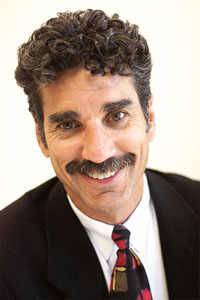- A study of young adults, using functional magnetic resonance imaging to examine the neural substrates of sociality and spirituality.
- A study of young adults to explore their mental representation of God. They will be asked a range of questions, including whether they communicate with a higher being, feel inner peace through a relationship with a higher being or do not have an awareness at all of God’s presence.
- A study of the older adults, which will look at the way belief promotes good mental health and reduces feelings of loneliness and depression.
- A study called “Something to Live For” that examines whether religious belief diminishes social conflicts, improves sleep and provides for successful aging.
- A study to determine the relationship between cardiovascular health and belief in God, based on the religion-related questions that have been asked of older adults since the beginning of the study.
Cacioppo directing study on health benefits derived from spiritual beliefs
By William HarmsNews Office
 John Cacioppo | |
A belief in God may improve a person’s physical health, according to University researchers who are launching the first comprehensive study to examine the relationship between religious attitudes and health.
The Pennsylvania-based John Templeton Foundation has given the University $1.8 million to launch the study, which will be coupled with current University work on aging that is supported with $7.5 million from the National Institute on Aging of the Department of Health and Human Services. The NIA-funded work is an interdisciplinary effort to understand the connections between longevity and loneliness. Religious belief, like social connections, could have beneficial effects on people’s health, scholars contend.
Because the research is multidisciplinary, including researchers in the departments of Medicine, Psychology, Sociology, Psychiatry, History, Human Development and the Divinity School, it provides a useful framework to study scientifically the connections between religious belief and health, said John Cacioppo, the Tiffany and Margaret Blake Distinguished Service Professor in Psychology and the leader of both studies. Cacioppo is one of the nation’s leading experts on social relations and aging.
“The study is based on an evolutionary model of humans as social beings in which the motive to form and maintain attachments and interpersonal relationships is in part genetically determined,” Cacioppo said. As a result, people are born with the capacity for sociality and spirituality, he said. The work will explore how this inclination to form personal connections with others and with God varies among individuals because of social and environmental influences.
Among the initial findings of the study is that a strong belief in God can have an impact on reducing depression, particularly among African Americans.
Measurable effects of strong spirituality, regardless of religion, can include improved physiological functioning, health and well-being, especially in difficult times, Cacioppo said. Those benefits of belief in God accrue over time and are an important aspect of dealing with aging, he said.
Subjects in the current study on longevity and loneliness—which is called the Chicago Health, Aging and Social Relations Study—have been asked a battery of questions related to their health, exercise habits and emotions, as well as church attendance and religiosity.
For that project, the researchers began a series of daylong interviews and medical tests that began in 2002 and will continue through 2006. The study includes 230 African Americans, Latinos and whites between the ages of 50 and 67 from Chicago and the suburbs. The researchers are gathering extensive medical histories, health assessments, health care utilization measures, health behavior measures, sleep quality indices, personality measures and life events assessments.
The Templeton grant will permit researchers to work on these additional research projects:
![[Chronicle]](/images/sidebar_header_oct06.gif)